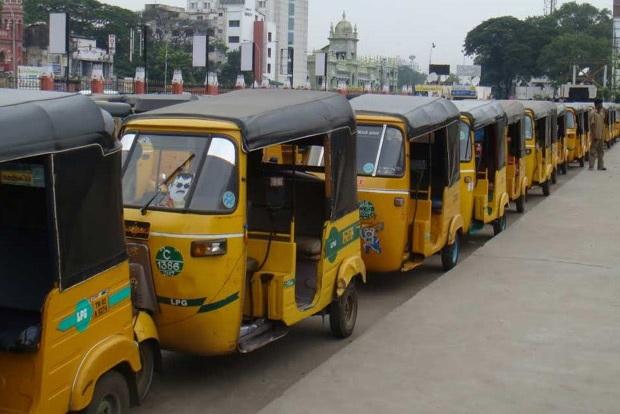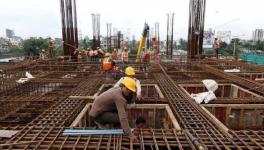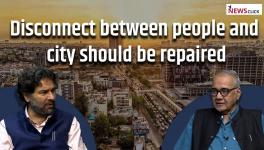‘In Chennai, 71% Resident Informal Workers Lost Jobs in Past 2 Months’

Representational image. | Image Courtesy: DTNext
In the past two months, there have been numerous news reports on the tragic condition of India’s migrant labourers and rural poor. Resident urban informal workers, too, are equally affected but have not received as much attention.
A telephonic survey of 67 households in Chennai city to understand the status of livelihoods of urban informal workers during this coronavirus pandemic and lockdown, suggests that the two-month lockdown has worsened their economic condition. This is due to a combination of factors which include loss of employment, housing-related distress, and informal debt.
Basic Characteristics of the Survey
The survey was done between April 13 and April 23. Our survey covered various informal workers, such as domestic workers, auto drivers, mechanics, security guards, tailors, hawkers, etc. The focus of the survey was informal workers whose primary residence is Chennai city. About 91% of our respondents were permanent residents of the city.
Among 67 respondents, we had 38 casual workers, 14 self-employed, and 15 daily wage labourers. Only 40 % of these workers were registered in various informal workers’ welfare board, such as construction workers’ welfare board, auto and taxi drivers’ welfare board and such other informal workers’ welfare boards.
Housing Crisis and Informal Debt Trap
A total of 71% of the survey respondents have lost employment due to the lockdown. None of the casual labourers who lost their employment received any wages from their employers. This shows that the union government’s plea to not withhold wages was of no help to urban informal workers, who account for much of the country’s urban labour force. Further, 76% of the respondents were living in rented houses. House rent is a major economic burden and the lockdown has only worsened it. Among Indian states, urban Tamil Nadu has one of the highest proportions of people living in rented dwellings: 46.7% of households live in rented houses and 32.1% of them do not have any written rental contract (National Sample Survey Organisation or NSSO Report No. 584, 2018). It can, therefore, be safely assumed that a majority of 32.69 lakh (estimated) households that live in informally rented units are urban informal workers’ households.
An unenforceable announcement by the Tamil Nadu government to not collect house rent during the lockdown has not helped anyone. The respondents said that they were forced to pay rent because defaulting on rent payment would have had a serious impact on their housing conditions, if not now then definitely in the post-lockdown world.
In addition to rent, landlords literally loot tenants through electricity and water charges. In Chennai city, the norm is to collect between ₹7-10 per unit of electricity consumed (regardless of the actual consumption) depending upon the locality. Whereas the subsidised electricity cost is either free or between ₹1.50-6.60 per unit, depending on the electricity consumed. The lack of a written rental agreement provides no protection to tenants, who face constant fear of unannounced eviction. Rental payment is one of the primary factors contributing to rising urban inequality and this pandemic and lockdown have brought the suffering of urban tenants to the fore.
The need to pay bills and satisfy basic needs during the lockdown also pushed several urban informal workers into a potential informal debt trap. Of the total respondents, 55% reported to have borrowed money from moneylenders to manage economic hardship during this lockdown. Among these 37 respondents, 19 already have outstanding informal loans.
When asked how they were planning to manage if the lockdown was extended (we were in the first and second phase of the lockdown during the survey), 27 (40%) respondents said they were dependent on moneylenders and 20 (30%) respondents said they were clueless as they had already exhausted their capacity of informal borrowing. Lack of access to formal credit and lack of support from their employers and the government during this lockdown has put the urban poor at risk of falling into an informal debt trap, which will have a grave impact on their lives in years to come.
Failure in Distribution of Relief Funds
Though the Union government boasts of lakhs of crores (the actual allocation of this is explained enough in news articles) allocated as COVID relief package, only meagre allocations are for income support for some sections in need.
In comparison, the Tamil Nadu government’s effort to provide free ration and ₹1,000 to below-poverty-line population has reached a large proportion of eligible beneficiaries. Of our respondents, 88% have collected ₹1,000 provided by the state government and 60% received both free ration and ₹1,000. Those who did not receive money cited lack of documentation as a reason, and those who did not receive ration cited the crowd, distance to ration shop, and other problems in distribution as reasons.
The Tamil Nadu government announced ₹2,000 as a relief to be paid in two installments to informal workers. Compared with free ration and ₹1,000 provided to below-poverty-line population, the ₹2,000 to informal workers has not reached many beneficiaries, because this benefit was applicable only to workers currently registered in various informal workers’ welfare boards.
As noted above, only 40% of the respondents were registered in various informal workers’ welfare boards. Even among them, only six respondents said they had received the first installment of ₹1,000.
According to periodic labour force survey 2017-18, urban Tamil Nadu has a minimum of 74 lakh informal workers, while overall the state has about two crore informal workers. According to Sugumaran, General Secretary of Centre of Indian Trade Unions, Tamil Nadu, there are 73 lakh members registered in 17 various informal workers’ welfare board across the state, but the TN government relief for informal workers has reached only 23 lakh labourers, including rural informal workers. The majority of this has gone to construction workers. The Tamil Nadu labour minister, Nilofer Kafeel, had, in fact, announced that around 13 lakh construction workers would receive the coronavirus relief amount.
Singaravelan, president of the Construction Workers Federation of India, told us that a total of 43 lakh construction workers were registered in construction workers’ welfare board, but only 12-13 lakh renewed their membership. He said renewal of membership was not easy as labourers were not educated. Also, renewal was a cumbersome process as the labourers require authorisation from multiple government officials and need to submit several documents.
He further added that the relief amount does not come from the government’s corona relief fund, rather it is from the welfare board’s fund (1% cess is collected from any construction towards construction workers welfare fund).
Balu, a union leader of the Auto Driver Association, Tamil Nadu, claimed there were a total of 16 lakh drivers in the state, which includes drivers of auto, taxi, trucks, and other commercial vehicles. Only 83,500 among the 16 lakh drivers are registered in the drivers’ welfare board.
Balu said he disagreed with the government’s claim that 83,500 drivers would receive the relief payment because only 40,000 members were currently registered with the board.
The Tamil Nadu government was able to identify only 9,000 beneficiaries out of these 40,000 members. As many as 46 lakh informal workers have not renewed their membership among a total of 74 lakh registered members in various informal workers’ welfare board. In 2013, government suspended trade unions’ involvement in renewing membership of informal workers, which has contributed to the decline in membership renewal.
The survey also found that the coronavirus relief payment had reached less than 20% of informal workers in Tamil Nadu. There are three reasons for the failure in distribution: 1) lack of registration of informal workers in welfare boards; 2) lack of renewal of membership due to cumbersome procedures; and 3) problems with identifying beneficiaries. The government has declined trade unions’ offer to help in identifying beneficiaries.
Act Now, or Matters Will Become Worse
Informal workers have limited or no power to bargain with their employers. This pandemic and lockdown have pushed them to the brink of an informal debt trap which will force them to settle for even lower wages in a post-lockdown world.
While it is the responsibility of the government to protect the interests of informal workers, both Central and state government haves used this pandemic to extend working hours and relax other labour regulations, which will worsen the condition of labour in India. If the government does not provide enough relief and protect the informal workers after the lockdown is relaxed, the livelihood of urban poor will only worsen in days to come.
The apathy of government towards urban poor will only lead to a severe demand crisis in Indian economy which is already on the brink of a recession.
The writer is a Ph.D scholar in economics in University of Massachusetts, Amherst, USA. The views are personal.
Get the latest reports & analysis with people's perspective on Protests, movements & deep analytical videos, discussions of the current affairs in your Telegram app. Subscribe to NewsClick's Telegram channel & get Real-Time updates on stories, as they get published on our website.
























